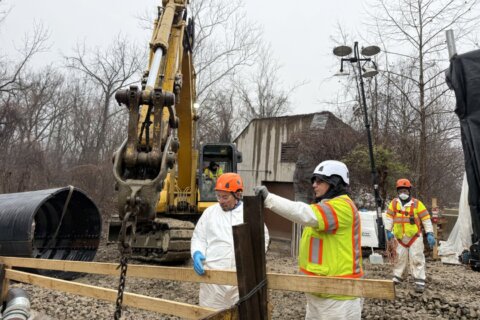This article was republished with permission from WTOP’s news partners at Maryland Matters. Sign up for Maryland Matters’ free email subscription today.
This content was republished with permission from WTOP’s news partners at Maryland Matters. Sign up for Maryland Matters’ free email subscription today.
Montgomery County leaders have never been keen on Gov. Larry Hogan’s plan to add variably-priced toll lanes to the Capital Beltway and I-270.
Now, with Hogan set to leave the State House in January — and many elements of the project yet to be nailed down — county officials are increasingly optimistic that Maryland’s next governor will take office with the power to steer congestion relief efforts in a new direction.
Local officials have reasons to be hopeful.
Consider:
— The international consortium that won a potentially lucrative contract to design the toll lanes exactly a year ago still lacks a construction company to actually build them.
Accelerate Maryland Partners, a firm led by the Australian toll road operator Transurban, lost its original construction partner, Archer Western, for reasons that have never been made public. The consortium began looking for a new road builder within weeks of winning the $54 million Maryland Department of Transportation design contract, quickly settling on three potential suitors.
Although a year has passed, a Transurban spokesman confirmed last week that the search continues. She declined to comment on reports that AM Partners has been in prolonged negotiations with a potential contractor.
“Accelerate Maryland Partners’ procurement for a design and construction contractor remains active so I cannot confirm a selection,” she said, “but we hope to conclude that process shortly.”
Hogan has boasted that his toll lanes project is one of the “largest in the world.” The failure to lure a new construction contractor has fed suspicions that AM Partners used unrealistically low profit margins to boost its procurement score.
Those suspicions are at the heart of a bid protest filed by a firm that lost out to AM Partners. “The basis of the bid protest is that they won the contract with a low bid when they didn’t have a construction contractor, claiming that the [eventual] construction contractor would work for low profits,” said Ben Ross, head of the Maryland Transit Opportunities Coalition.
“A year later, they haven’t found one. We don’t know for sure that it’s because of price, but what else would it be?”
— When Capital Express Mobility Partners (CEMP), a consortium made up of a large group of Spanish firms, challenged MDOT’s decision to go with AM Partners, the agency expressed confidence in its bid process.
CEMP won the first round of its legal battle with the state, in Montgomery County Circuit Court, a victory that forced the agency to conduct an internal review of the procurement. To no one’s surprise, MDOT reaffirmed its decision to go with AM Partners.
(A former member of Hogan’s staff is now a top Transurban official, with a portfolio that includes getting the toll lanes contract across the finish line before the governor leaves office. And Hogan included top company officials on a trade mission to Australia.)
Round 2 of the CEMP-MDOT battle will play out in court this fall, when the losing bidder’s appeal is heard by the Court of Special Appeals. The case has just been scheduled for Nov. 22.
— Toll lanes advocates hoped the Federal Highway Administration would give the project its formal green light on Aug. 5. Two days before the agency’s “target date” for a ruling, Transportation Secretary Jim Ports received word that a final decision had been put off.
That delay prompted howls of protest — and threats of legal action — from Hogan. The federal highway administration gave no reason for not issuing a “record of decision,” nor have they issued a new target date. Because the project is unpopular with the state’s mostly Democratic congressional delegation, Hogan cannot turn to lawmakers to help him speed things along.
— When the toll lanes project faced a potential repudiation from a regional transportation panel, then-Transportation Secretary Greg Slater swooped in and cut a controversial deal with five members of the Montgomery County Council.
Due mostly to the county’s term limits law, the council that takes office in December is expected to have dramatically different views on the toll lanes than the current panel. Based on their responses to candidate questionnaires, Ross believes that seven of 11 council members will lean against the project in its current form, a potentially important shift if the next council has the new governor’s ear.
— Hogan’s successor is unlikely to run with the project in its current form. If former Commerce Secretary Kelly Schulz (R) had secured her party’s gubernatorial nomination, Hogan probably wouldn’t need to keep his foot on the gas quite so much. But she lost the GOP primary to first-term state Del. Dan Cox (Frederick).
Neither Cox nor Wes Moore, the winner of the Democratic gubernatorial primary, are fans of Hogan’s public-private partnership approach to traffic relief. In one of his first post-primary interviews, Moore told WAMU he would like to see “a new type of proposal.”
“It seems likely that the responsibility for this project is going to end up with the next governor,” said Montgomery County Executive Marc Elrich (D), a longtime critic. “I am encouraged by some of the comments that have already been made by candidate Moore.”
“We should not be rushing into judgement on things when we have potentially a new administration coming in, in several months, that will view this project very differently,” said Del. Jared Solomon (D-Montgomery), another project critic.
Elrich said it would be “really helpful to be able to work with somebody who is focused on a solution to the traffic problem rather than focused on having a P3.”







